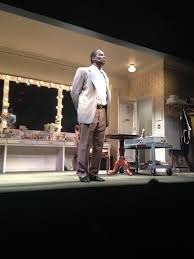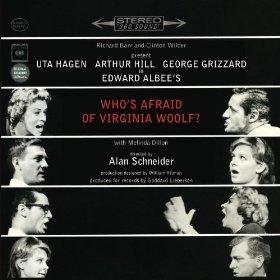Terry Teachout's Blog, page 15
March 17, 2014
The rest of me
 The off-Broadway transfer of
Satchmo at the Waldorf
has now been running at the Westside Theatre for just shy of a month--two weeks of previews, two weeks of regular performances--and while I remain amazed that it got there in the first place, I also find myself growing more accustomed to its continuing presence.
The off-Broadway transfer of
Satchmo at the Waldorf
has now been running at the Westside Theatre for just shy of a month--two weeks of previews, two weeks of regular performances--and while I remain amazed that it got there in the first place, I also find myself growing more accustomed to its continuing presence.Whereas I used to come to the theater nearly every night, I no longer drop in on performances save to welcome a friend who's there to see Satchmo. When I do, I usually watch the show from beginning to end, then go backstage to visit John Douglas Thompson in his dressing room. Most of the time, though, I prefer to stay at home with Mrs. T and read the nightly performance reports from Linda Marvel, our omniscient stage manager.
None of this means that I take Satchmo for granted. It continues to be a great adventure and a source of intense personal pride. But I'm emotionally and physically drained from the stress of getting it open in New York, in part because I wasn't able to take any time off from my day job at The Wall Street Journal to do so, or to rest up after opening night. March and April are the busiest of months for a New York drama critic, and I have a couple of dozen shows to see and review on and off Broadway, as well as a trio of consecutive out-of-town speaking engagements that will soon take me to Tucson, New Haven, and Baltimore.
 For all these reasons, the actual opening night of Satchmo barely seems real to me now. It happened, I was there, and now...the moment's over.
For all these reasons, the actual opening night of Satchmo barely seems real to me now. It happened, I was there, and now...the moment's over.To be sure, I can't claim anything remotely approaching the detachment of Paul Hindemith, who once told the mezzo-soprano Jennie Tourel something that I find all but impossible to fathom:
Hindemith, after he wrote a piece, wasn't interested in it anymore. He never came to hear my Marienleben; although he knew I do it very well, he said he's not interested to hear it--he's written it.
Not me. I still find it fascinating to watch John perform Satchmo. If any other actors should appear in the play in the future, I'll be just as eager to see them do it, and (if possible) to help them rehearse it. But the huge psychic space that Satchmo has occupied in my mind for the past couple of years is finally starting to shrink, like a thirsty tumor responding to chemotherapy.
I discovered last week, for instance, that I was hungry to hear classical music again after a long hiatus. Among other things, I've listened to Aaron Copland's Violin Sonata, Schubert's Octet, the Brahms Fourth Symphony and Liebeslieder Walzer, Bernard Herrmann's Souvenirs de Voyage, Beethoven's last string quartet, and Haydn's last piano sonata. I've also read a stack of books about music, including Bernard Shore's The Orchestra Speaks and biographies of Arturo Toscanini, Otto Klemperer, and Herbert von Karajan. In addition, I chewed my way through the four volumes of Robert Caro's Lyndon Johnson biography (a byproduct, no doubt, of my having seen and reviewed All the Way). Now I'm reading Mark Harris' Five Came Back: A Story of Hollywood and the Second World War , an excellent book about which I'll be writing an essay for Commentary next week.
 I'm also spending more time looking at the art on the walls of our Hudson Heights apartment, which in recent weeks I'd been taking more or less for granted--an admission that I blush to make. It's little short of sinful to look at the work of artists like Milton Avery, Nell Blaine, Richard Diebenkorn, and Fairfield Porter without seeing it, especially when you're privileged to live with their creations from day to day. Yet that's exactly what I was doing, and I'm relieved to say that I'm not doing it anymore.
I'm also spending more time looking at the art on the walls of our Hudson Heights apartment, which in recent weeks I'd been taking more or less for granted--an admission that I blush to make. It's little short of sinful to look at the work of artists like Milton Avery, Nell Blaine, Richard Diebenkorn, and Fairfield Porter without seeing it, especially when you're privileged to live with their creations from day to day. Yet that's exactly what I was doing, and I'm relieved to say that I'm not doing it anymore.I am, in short, becoming myself again--or, rather, my selves. The newest of those selves is a playwright, one whose first play has just been produced in New York. The others, however, are at least as important to me, and it's nice to have them back again. Even as a boy, I had a restless mind, though I long ago acquired the iron discipline without which it's impossible to keep more than one professional ball in the air simultaneously. When I'm doing something, no matter what it may be, I live by the words of the preacher: Whatsoever thy hand findeth to do, do it with thy might; for there is no work, nor device, nor knowledge, nor wisdom, in the grave, whither thou goest. But once it's done, I do something else.
Beyond hitting my usual Journal and Commentary deadlines, I'm not yet sure what that something else will be. I have three unfinished scripts that are crying out to be revised, as well as an idea for a biography that excites me. At the same time, the thought has also occurred to me that I might do better to lay fallow for a couple of months, then take Rudyard Kipling's oft-quoted advice: "When your Daemon is in charge, do not try to think consciously. Drift, wait, and obey."
For the moment, though, my Daemon, if I have one, isn't sending any signals. Nor am I listening for them too closely. There is a time to be reborn, and a time to sleep late.
Just because: Aaron Copland conducts his Third Symphony
(This is the latest in a series of arts-related videos that appear in this space each Monday and Wednesday.)
Almanac: Herbert von Karajan on photography
Herbert von Karajan (quoted in Richard Osborne, Herbert von Karajan: A Life in Music)
March 15, 2014
OUTING NORMAN ROCKWELL
FIRST IMPRESSIONS
March 14, 2014
Yo, Broadway, it's Rocky!
* * *
"Rocky," a no-budget quickie that grossed a $225 million, won the best-picture Oscar and spawned five sequels, has become a big-budget Broadway musical with a score by Lynn Ahrens and Stephen Flaherty ("Ragtime") and a book co-written by Mr. Stallone and Thomas Meehan ("Annie," "The Producers"). That's a high-toned pedigree, especially for a musical based on a movie that the cognoscenti long ago wrote off as a lowbrow joke.
 Let's start, then, by stipulating that the film is excellent of its kind, a juicy cinematic cheesesteak that does exactly what it sets out to do. Pauline Kael got "Rocky" right when she deigned to admit that "its naïve, emotional shamelessness is funny and engaging." (John Simon liked it, too!) What's more, the stage version, directed with immense panache and soaring physicality by Alex Timbers ("Bloody Bloody Andrew Jackson"), is very nearly as good, an unpretentious slice of honest entertainment whose rock-'em-sock-'em finale will set the snobbiest of theatergoers to cheering in spite of themselves.
Let's start, then, by stipulating that the film is excellent of its kind, a juicy cinematic cheesesteak that does exactly what it sets out to do. Pauline Kael got "Rocky" right when she deigned to admit that "its naïve, emotional shamelessness is funny and engaging." (John Simon liked it, too!) What's more, the stage version, directed with immense panache and soaring physicality by Alex Timbers ("Bloody Bloody Andrew Jackson"), is very nearly as good, an unpretentious slice of honest entertainment whose rock-'em-sock-'em finale will set the snobbiest of theatergoers to cheering in spite of themselves.In the manner of most screen-to-stage musical-comedy adaptations, "Rocky" sticks closely, at times slavishly, to the source, with the best lines from Mr. Stallone's screenplay incorporated more or less verbatim into the book ("I'll carry him for a couple of rounds and then drop him in the third like a bad habit"). Likewise Andy Karl, the star, who does a baldly straightforward Stallone impersonation. (Not so Margo Seibert, a superior singer who succeeds in finding her own way into the character of Adrian, Rocky's plain-Jane neighborhood girlfriend, who was played so well in the film by Talia Shire.) Here, though, that's not a complaint, for the faithfulness of the adaptation is also the source of its strength: Like the film, it gives you lots of what you want.
It helps that the rock-flavored songs, which in musicals of this sort typically prove to be an incapacitating impediment, are generally quite good, though I confess to having smiled at Mr. Karl's big number, whose title is "My Nose Ain't Broken." The ballads are all heartfelt and irony-free, and one of them, "Raining," is memorable...
Will Eno is a hot young playwright who's getting hotter: He'll be making his Broadway debut in April with "The Realistic Joneses." In the meantime, Signature Theater is putting on his latest play, "The Open House," in which Mr. Eno's surreal style of serious comedy fails to seal the deal. The setting is a nondescript suburban home ruled by a wheelchair-bound monster of sarcasm (Peter Friedman) whose wife, grown children and widowed brother (Carolyn McCormick, Hannah Bos, Danny McCarthy and Michael Countryman) have all been cowed by his snarling contempt. Midway through the show, they quit the stage one by one and are replaced by strangers (played by the same actors) with totally different personalities. It's a promising premise, but onstage "The Open House" comes off like a cross between a variety-show sketch and a "Twilight Zone" episode....
* * *
Read the whole thing here .
Margo Seibert sings "Raining" at a showcase performance:
)
Printing the legend
* * *
 Four months after "Virginia Woolf" opened, the original cast made a studio recording of the play. Columbia Records released it as a pricey four-LP set that went out of print a few later and was never reissued--until now. Masterworks Broadway has finally released "Virginia Woolf," both as a digital download and as a two-CD set. What's more, it's even more of a rarity than you might suppose. The "Virginia Woolf" album is still, so far as I know, the only uncut commercial sound recording of a major 20th-century English-language play to have been made by the entire original cast. (Original-cast recordings of Broadway musicals are commonplace, but they're usually heavily abridged.)
Four months after "Virginia Woolf" opened, the original cast made a studio recording of the play. Columbia Records released it as a pricey four-LP set that went out of print a few later and was never reissued--until now. Masterworks Broadway has finally released "Virginia Woolf," both as a digital download and as a two-CD set. What's more, it's even more of a rarity than you might suppose. The "Virginia Woolf" album is still, so far as I know, the only uncut commercial sound recording of a major 20th-century English-language play to have been made by the entire original cast. (Original-cast recordings of Broadway musicals are commonplace, but they're usually heavily abridged.)And what's it like? Astonishing. All four actors plunge into their roles with caustic, unsparing ferocity. Naturally it would have been wonderful if their performances had been filmed, but you don't have to see Ms. Hagen and Mr. Hill clawing drunkenly at one another to be staggered by their black desperation. Merely to hear them is to know how great they were.
Great...but not definitive.
I've seen many stagings of "Virginia Woolf" over the years, some of which, like the 50th-anniversary Broadway revival, were at least as impressive as this one. And since Mr. Albee didn't direct the original production, this particular version, priceless and illuminating though it is, cannot claim to be anything other than one of many possible ways to perform "Who's Afraid of Virginia Woolf?"...
The same thing is true of "creator recordings," classical-music recordings made by some or all of the artists who gave the premiere of a piece. It even holds true when the composer is also one of the performers....
* * *
Read the whole thing here .
An excerpt from the original-cast recording of Virginia Woolf:
Almanac: Thoreau on politics
Henry David Thoreau, "Life Without Principle"
March 13, 2014
Almanac: John Kenneth Galbraith on politics
John Kenneth Galbraith, letter to John F. Kennedy (Mar. 2, 1962)
So you want to see a show?
Here's my list of recommended Broadway, off-Broadway, and out-of-town shows, updated weekly. In all cases, I gave these shows favorable reviews (if sometimes qualifiedly so) in The Wall Street Journal when they opened. For more information, click on the title.
BROADWAY:
• A Gentleman's Guide to Love & Murder (musical, PG-13, reviewed here)
• Matilda (musical, G, most performances sold out last week, reviewed here)
• Once (musical, G/PG-13, reviewed here)
OFF BROADWAY:
• Avenue Q (musical, R, adult subject matter and one show-stopping scene of puppet-on-puppet sex, reviewed here)
• The Fantasticks (musical, G, suitable for children capable of enjoying a love story, reviewed here)
• London Wall (serious comedy, PG-13, closes Apr. 13, reviewed here)
CLOSING SOON OFF BROADWAY:
• Middle of the Night (drama, PG-13, closes Mar. 29, reviewed here)
CLOSING SOON ON BROADWAY:
• No Man's Land/Waiting for Godot (drama, PG-13, playing in rotating repertory, closes Mar. 30, reviewed here)
CLOSING SUNDAY ON BROADWAY:
• Outside Mullingar (comedy, PG-13, nearly all performances sold out last week, reviewed here)
Terry Teachout's Blog
- Terry Teachout's profile
- 45 followers



